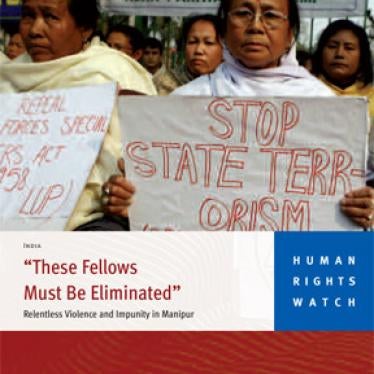(New York) - Indian political leaders scheduled to visit Jammu and Kashmir on September 20, 2010, should call for the immediate repeal of the Armed Forces Special Powers Act and a full and transparent inquiry into human rights abuses that underlie the current protests, Human Rights Watch said today. The state government should release the findings of its inquiry into allegations of excessive use of force during the ongoing protests in Kashmir.
On September 15, Prime Minister Manmohan Singh summoned all political parties to the meeting in Delhi to discuss the continuing demonstrations in Indian-administered Kashmir. This week security forces shot and killed at least 20 people during often-violent protests following reports that the Quran had been desecrated in the United States. The protesters attacked government buildings, including police stations, and burned down a Christian school.
"The political parties should loudly endorse the immediate repeal of the Armed Forces Special Powers Act," said Meenakshi Ganguly, South Asia director at Human Rights Watch. "The immunity this law gives security forces not only leads to widespread abuse, but actually hurts the armed forces by protecting members who commit crimes instead of rewarding the ones who respect human rights."
The Armed Forces Special Powers Act, or AFSPA, grants the military wide powers to arrest without warrant, shoot to kill, and destroy property in so-called "disturbed areas." It also protects military personnel responsible for serious crimes from prosecution, creating a pervasive culture of impunity.
The situation in the Kashmir valley has been tense since the extrajudicial killings of three villagers by the army in April, followed by the killing of a teenager by police in Srinagar in June. State authorities have repeatedly placed several parts of the valley under curfew to contain the protests. Demonstrators have thrown stones at security personnel and destroyed public and private property. To contain the rioters, the police have sometimes used excessive force, causing deaths and injuries with live bullets, rubber bullets, and tear gas canisters. Each death has led to a fresh round of demonstrations and further violence. At least 94 people have died since June.
Human Rights Watch expressed grave concern for the attacks on Christian schools and urged the authorities to take the necessary measures to provide adequate protection to threatened private buildings.
In July, the Jammu and Kashmir state government ordered an inquiry into allegations that police firing on demonstrators used excessive force. Nearly 2,000 security personnel have been injured in attacks by demonstrators. Human Rights Watch called upon the authorities to abide by and implement the United Nations Basic Principles on the Use of Force and Firearms by Law Enforcement Officials, which provide that all security forces shall, as far as possible, apply nonviolent means before resorting to the use of force and firearms. Whenever the lawful use of force and firearms is unavoidable, the authorities must use restraint and act in proportion to the seriousness of the offense. Lethal force may only be used when strictly unavoidable to protect life.
"The protests have at times been violent, but the security forces need to respond as professional law enforcers," Ganguly said. "When the security forces unnecessarily use lethal force, especially against teenagers and even children, they make a bad situation far worse."
Human Rights Watch also called for a prompt, impartial, and transparent inquiry into allegations of human rights abuses, including torture, custodial killings, and enforced disappearances over the past two decades. Even in cases in which the government ordered investigations, the findings were not made public, and hardly any prosecutions were ordered. Repeated calls for the government to conduct a comprehensive inquiry and prosecute those responsible have gone unheeded.
"Political leaders should endorse a transparent inquiry, with a deadline for completing it and with prompt prosecutions where crimes were committed, because Kashmiris have repeatedly been left without any justice," Ganguly said. "Kashmiri leaders calling for protests should take steps to ensure that they are peaceful."







